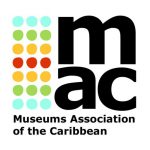MAC at ICOM: What Defines a Museum?
In September, members of MAC attended the ICOM Triennial Conference in Kyoto. The conference was in the news in Japan every day. Even internationally, the conference was picked up by the news because of a huge debate that erupted: was ICOM going to change its definition of ‘the museum’?
ICOM is the International Council of Museums. The organization was founded in Paris in 1946 and today works to support museums and their staff around the globe. As of 2018, ICOM has 44,686 members, most of whom are individuals working in museums or researching museums. On a global level, ICOM is involved in work and conversations related to museums and their collections. For museum professionals, the ICOM Code of Ethics is a guiding document used by many museum institutions which provides information for instance on how to ethically acquire new collections, or what to do with unwanted objects. ICOM’s Red Lists of cultural objects at risk are practical tools to curb the illicit traffic of cultural objects and are used among others by customs officials and police. Perhaps best known to the public is ICOM’s annual event: International Museum Day. IMD is held on May 18th and is celebrated with special events and activities in tens of thousands of museums around the world.
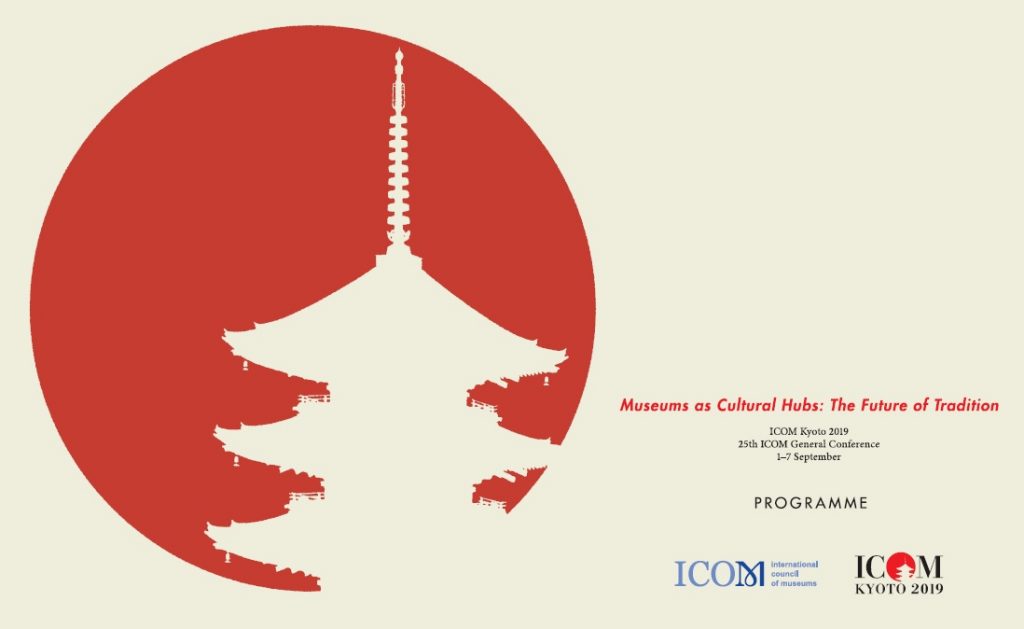
Every three years, ICOM holds a major conference. This triennial conference, under the theme ‘Museums as Cultural Hubs: The Future of Tradition,’ was organized by ICOM Japan and held in Kyoto on 1-7 September 2019. The program was packed with formal meetings of councils and committees, keynote lectures, plenary sessions, and workshops. There were social events nearly every evening held at Kyoto museums or heritage venues. Over several days, ICOM’s 30 International Committees each held parallel sessions. Alongside the conference, a large museum expo was held in three halls of the Kyoto International Conference Centre. The conference had over 5000 participants.
Joint Session MAC/CAM/AFRICOM/PIMA
MAC participated in a joint session with representatives of the Commonwealth Association of Museums (CAM) and AFRICOM. Sadly, the Pacific Islands Museums Association (PIMA) was not present to attend. Former board member Ruth Linton (Museum of Parliament and the National Heroes Gallery & ICOM Barbados) and MAC communications manager Csilla Ariese presented MAC’s recent work. The session was designed to enable these so-called Affiliated Organizations of ICOM to get together, discuss common issues, and work towards joint solutions. CAM, AFRICOM, PIMA, and MAC are vital to ensuring that certain voices remain heard within the international museum community. For the Caribbean, many islands or countries may not have enough ICOM members to have their own National Committee to represent them formally, or they may not adequately be represented through overseas National Committees. The joint session concluded with a commitment to reach out to PIMA to support a revival of the organization, as well as plans to propose to ICOM for increased support to these Affiliated Organizations.
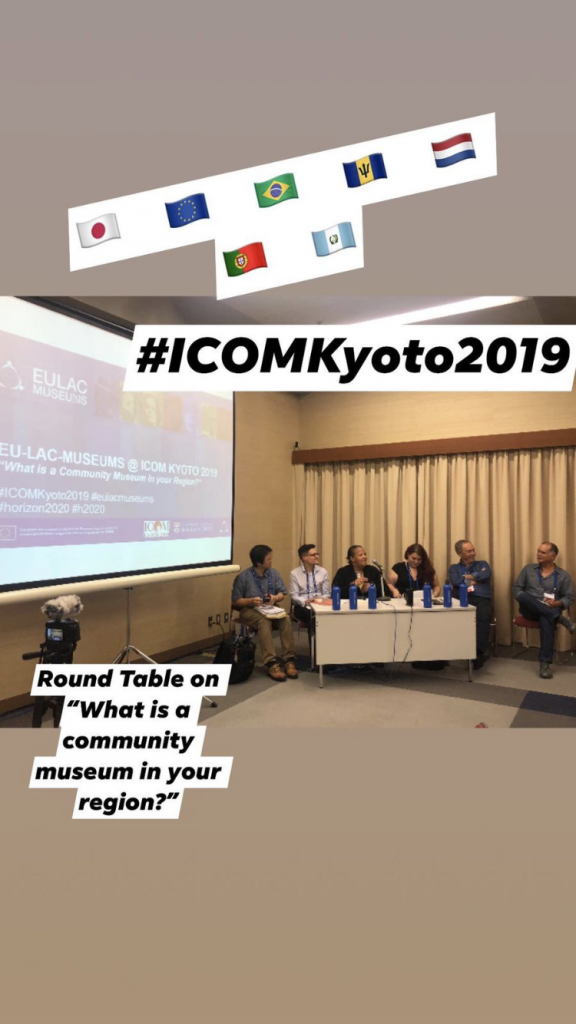
Round Table on Community Museums
MAC also took part in a round table organized by the EU-LAC-Museums project around the question: “What Is a Community Museum in your Region?” On behalf of MAC, Csilla Ariese was one of the panelists to speak about museums in the Caribbean on the basis of her PhD research. The panel further included Bruno Brulon Soares (ICOFOM; Brazil), Kenji Saotome (ICOM-ICR; Japan), Luis Raposo (ICOM-Europe; Portugal), and Samuel Franco Arce (ICOM-LAC; Guatemala). The chair of the round table, Alissandra Cummins (former MAC president; Barbados Museum & Historical Society), asked the panelists to each answer these four questions:
1. What do you think a community museum is?
2. What types of small, local museums currently exist in your country?
3. What is the relationship between community museums in your country and local development? What kind of development do you think of, and in what ways does the community museum contribute to them? (eg economic, environmental, social)
4. What barriers exist to building community empowerment through local museums in your country, and how might we overcome them?
The discussion showed that there are differences in how people define ‘community museum’ around the world, although terms such as ‘small’ and ‘local’ were mentioned by most panelists. The challenges facing community museums were often very particularly to local settings, but again it was possible to see some overarching themes, such as a lack of recognition or a vulnerability to development projects.
Sustainability
A major conversation at the conference was the planetary crisis in terms of climate change and the need for museums to focus on sustainability. How can museums provide visitors with information about climate change, while becoming more sustainable institutions themselves? Delegates were quick to reflect on themselves and the conference, wondering about the sustainability of such a major international meeting and the impact on the environment. The urgency of the climate crisis was highlighted by the destruction of hurricane Dorian simultaneously battering the other side of the world as it hung over Abaco Island and Grand Bahama Island over two days. The National Gallery of the Bahamas quickly mobilized to provide support to its affected communities in terms of mental health and by collecting material donations.
Museum Definition
The biggest debate was about the definition of the museum. We all have a feeling about what museums are, what they can be, and what they are not, but as part of its Code of Ethics, ICOM provides a formal definition of the term. In many countries in the world, this museum definition is hugely important. In some places it is included in heritage legislation, elsewhere it forms the basis of national museum associations and determines who can be a member, or it may be used to determine who is eligible for cultural funding. Perhaps you might be surprised to learn that the first definition from 1946 includes zoos and botanical gardens, but excludes libraries. ICOM has been working on a new definition since its last Triennial in 2016 through a collaborative process. Over 250 suggestions for a new definition were received from the public and distilled by the working group. In Kyoto, the General Assembly was asked for vote on a proposed new definition:
“Museums are democratising, inclusive and polyphonic spaces for critical dialogue about the pasts and the futures. Acknowledging and addressing the conflicts and challenges of the present, they hold artefacts and specimens in trust for society, safeguard diverse memories for future generations and guarantee equal rights and equal access to heritage for all people.
Museums are not for profit. They are participatory and transparent, and work in active partnership with and for diverse communities to collect, preserve, research, interpret, exhibit, and enhance understandings of the world, aiming to contribute to human dignity and social justice, global equality and planetary wellbeing.”
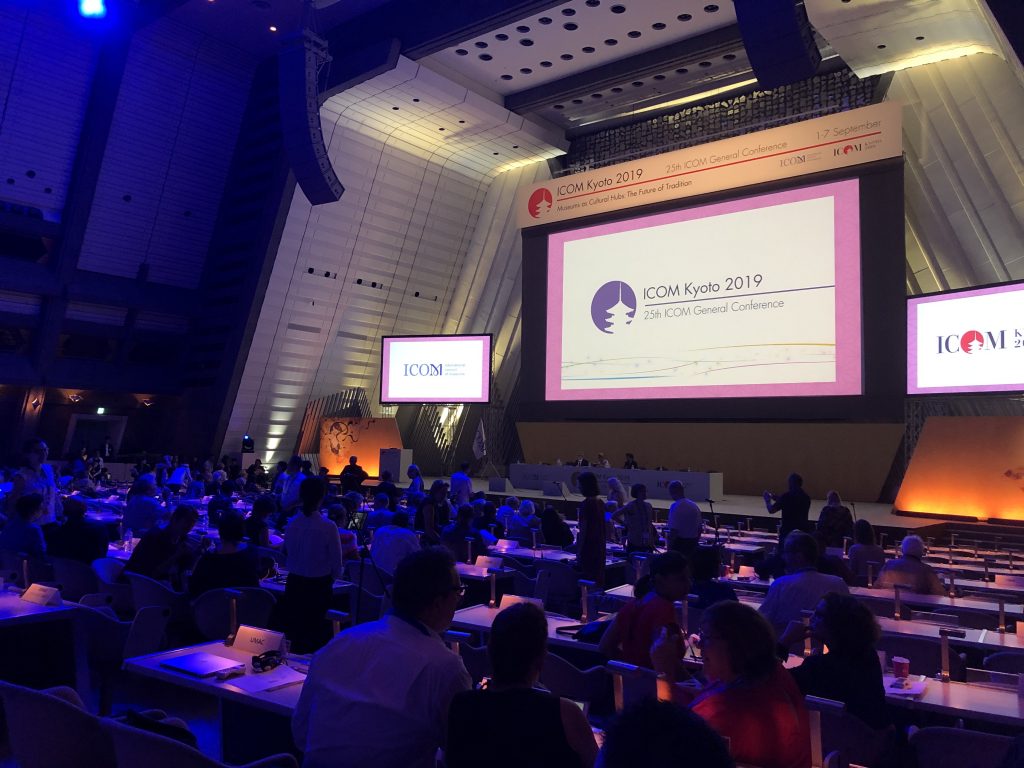
Most of the conference participants were pleased with the general intention and meaning of the proposed new definition and were happy to see that it creates a strong role for museums to be active parts of contemporary society. However, even though they were happy with the message, almost everyone felt that it was not a definition. Perhaps it was more of a vision statement, or a mission, or a roadmap, or even goals such as the Strategic Development Goals. Delegates were worried that changing the definition to this text would lead to legal, political, and practical issues. Would defining museums as ‘democratising spaces’ play into the hands of politicians who could then dismiss museums as anti-state and withdraw their financial support? Or would it protect museum institutions who might have anti-governmental narratives? Could such a definition be enforced in matters of cultural heritage laws? Part of the membership called for a postponement on the vote. Others argued the vote was on the agenda and needed to take place. Csilla Ariese was present in the room to vote on behalf of MAC and had been torn on how to vote. Yes, I felt that the definition was of relevance to many museums in the Caribbean. I could envision how it might protect and strengthen some institutions, although it might jeopardize others. I would have liked to vote “yes for the text as a vision statement” but to develop a more general, single-sentence definition. But would it be wise to vote “yes,” changing the statues of ICOM and impacting legislation beyond what I could oversee, just to support the sentiment of the definition?
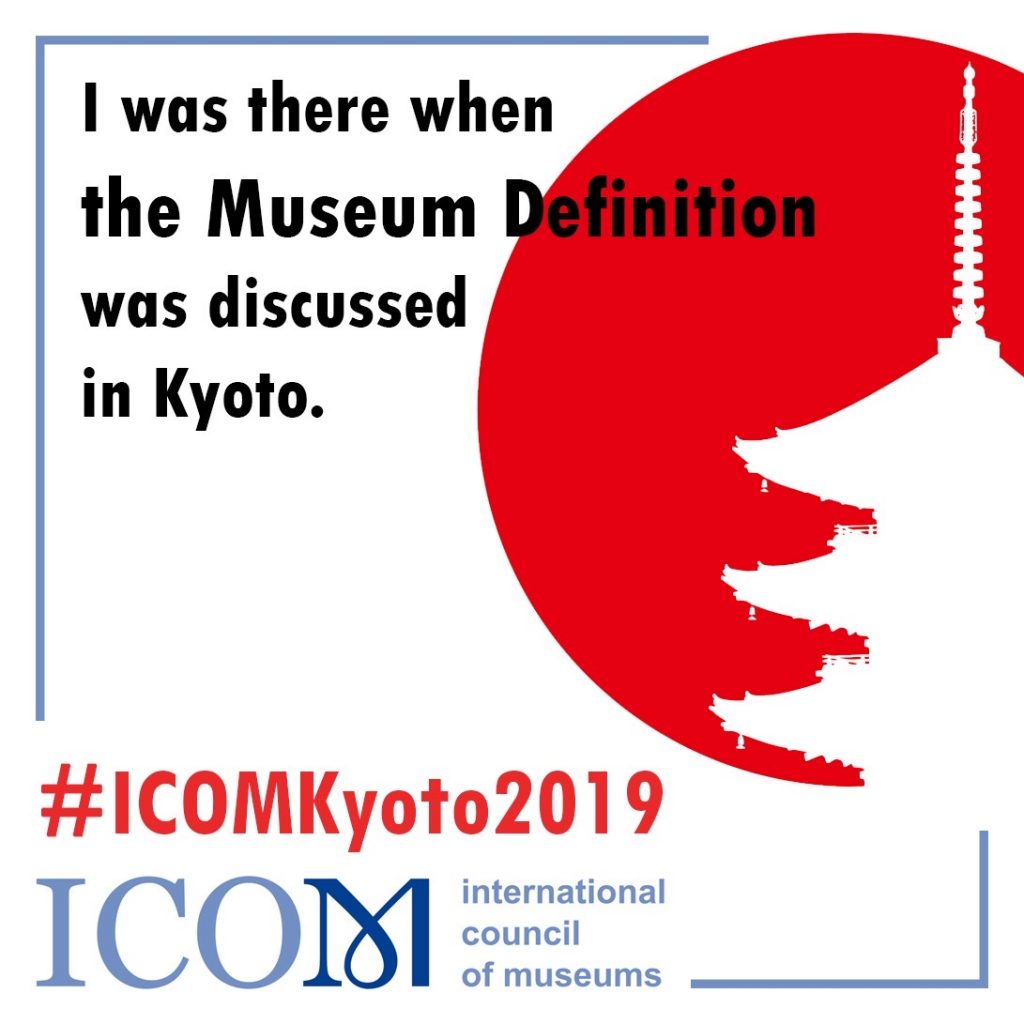
In the end, it became clear that a vote on the definition would never pass as it needed a two-thirds majority. Instead, the President of ICOM and chair of the Extraordinary General Assembly opted to vote whether to postpone a decision on the definition until at most the next ICOM General Assembly, next year in Paris. The vote to postpone passed. With that, the working group for the new definition can get back to work.
And what now? The working group will get back to working on the definition, but will definitely need more help from ICOM and its members. Now is the time to join the debate. A good starting point might be reading the issue of Museum International devoted to the museum definition. If you are already a member of ICOM, you can consider joining an International Committee or becoming more active in your National Committee to be part of the discussion moving forward. MAC will continue to be part of the conversation and will try to ensure that the voting process next year in Paris will be as inclusive and representative as possible. This is a challenge for ICOM, an organization with 80% of its membership in Europe, so it will be crucial to find ways for ICOM members from outside of Europe to be able to attend the vote.
